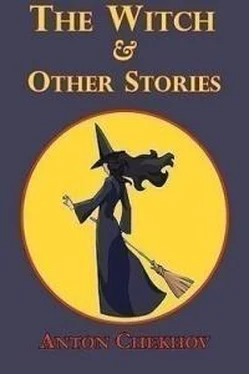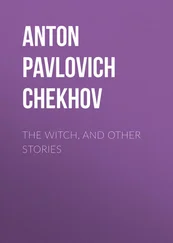It happened I was with this Savka one fine May evening. I remember I was lying on a torn and dirty sackcloth cover close to the shanty from which came a heavy, fragrant scent of hay. Clasping my hands under my head I looked before me. At my feet was lying a wooden fork. Behind it Savka's dog Kutka stood out like a black patch, and not a dozen feet from Kutka the ground ended abruptly in the steep bank of the little river. Lying down I could not see the river; I could only see the tops of the young willows growing thickly on the nearer bank, and the twisting, as it were gnawed away, edges of the opposite bank. At a distance beyond the bank on the dark hillside the huts of the village in which Savka lived lay huddling together like frightened young partridges. Beyond the hill the afterglow of sunset still lingered in the sky. One pale crimson streak was all that was left, and even that began to be covered by little clouds as a fire with ash.
A copse with alder–trees, softly whispering, and from time to time shuddering in the fitful breeze, lay, a dark blur, on the right of the kitchen gardens; on the left stretched the immense plain. In the distance, where the eye could not distinguish between the sky and the plain, there was a bright gleam of light. A little way off from me sat Savka. With his legs tucked under him like a Turk and his head hanging, he looked pensively at Kutka. Our hooks with live bait on them had long been in the river, and we had nothing left to do but to abandon ourselves to repose, which Savka, who was never exhausted and always rested, loved so much. The glow had not yet quite died away, but the summer night was already enfolding nature in its caressing, soothing embrace.
Everything was sinking into its first deep sleep except some night bird unfamiliar to me, which indolently uttered a long, protracted cry in several distinct notes like the phrase, "Have you seen Ni–ki–ta?" and immediately answered itself, "Seen him, seen him, seen him!"
"Why is it the nightingales aren't singing tonight?" I asked Savka.
He turned slowly towards me. His features were large, but his face was open, soft, and expressive as a woman's. Then he gazed with his mild, dreamy eyes at the copse, at the willows, slowly pulled a whistle out of his pocket, put it in his mouth and whistled the note of a hen–nightingale. And at once, as though in answer to his call, a landrail called on the opposite bank.
"There's a nightingale for you…" laughed Savka. "Drag–drag! drag–drag! just like pulling at a hook, and yet I bet he thinks he is singing, too."
"I like that bird," I said. "Do you know, when the birds are migrating the landrail does not fly, but runs along the ground? It only flies over the rivers and the sea, but all the rest it does on foot."
"Upon my word, the dog…" muttered Savka, looking with respect in the direction of the calling landrail.
Knowing how fond Savka was of listening, I told him all I had learned about the landrail from sportsman's books. From the landrail I passed imperceptibly to the migration of the birds. Savka listened attentively, looking at me without blinking, and smiling all the while with pleasure.
"And which country is most the bird's home? Ours or those foreign parts?" he asked.
"Ours, of course. The bird itself is hatched here, and it hatches out its little ones here in its native country, and they only fly off there to escape being frozen."
"It's interesting," said Savka. "Whatever one talks about it is always interesting. Take a bird now, or a man…or take this little stone; there's something to learn about all of them…. Ah, sir, if I had known you were coming I wouldn't have told a woman to come here this evening…. She asked to come to–day."
"Oh, please don't let me be in your way," I said. "I can lie down in the wood…."
"What next! She wouldn't have died if she hadn't come till to–morrow…. If only she would sit quiet and listen, but she always wants to be slobbering…. You can't have a good talk when she's here."
"Are you expecting Darya?" I asked, after a pause.
"No…a new one has asked to come this evening…Agafya, the signalman's wife."
Savka said this in his usual passionless, somewhat hollow voice, as though he were talking of tobacco or porridge, while I started with surprise. I knew Agafya…. She was quite a young peasant woman of nineteen or twenty, who had been married not more than a year before to a railway signalman, a fine young fellow. She lived in the village, and her husband came home there from the line every night.
"Your goings on with the women will lead to trouble, my boy," said I.
"Well, may be…."
And after a moment's thought Savka added:
"I've said so to the women; they won't heed me….They don't trouble about it, the silly things!"
Silence followed…. Meanwhile the darkness was growing thicker and thicker, and objects began to lose their contours. The streak behind the hill had completely died away, and the stars were growing brighter and more luminous…. The mournfully monotonous chirping of the grasshoppers, the call of the landrail, and the cry of the quail did not destroy the stillness of the night, but, on the contrary, gave it an added monotony. It seemed as though the soft sounds that enchanted the ear came, not from birds or insects, but from the stars looking down upon us from the sky….
Savka was the first to break the silence. He slowly turned his eyes from black Kutka and said:
"I see you are dull, sir. Let's have supper."
And without waiting for my consent he crept on his stomach into the shanty, rummaged about there, making the whole edifice tremble like a leaf; then he crawled back and set before me my vodka and an earthenware bowl; in the bowl there were baked eggs, lard scones made of rye, pieces of black bread, and something else…. We had a drink from a little crooked glass that wouldn't stand, and then we fell upon the food…. Coarse grey salt, dirty, greasy cakes, eggs tough as india–rubber, but how nice it all was!
"You live all alone, but what lots of good things you have," I said, pointing to the bowl. "Where do you get them from?"
"The women bring them," mumbled Savka.
"What do they bring them to you for?"
"Oh…from pity."
Not only Savka's menu, but his clothing, too, bore traces of feminine "pity." Thus I noticed that he had on, that evening, a new woven belt and a crimson ribbon on which a copper cross hung round his dirty neck. I knew of the weakness of the fair sex for Savka, and I knew that he did not like talking about it, and so I did not carry my inquiries any further. Besides there was not time to talk…. Kutka, who had been fidgeting about near us and patiently waiting for scraps, suddenly pricked up his ears and growled. We heard in the distance repeated splashing of water.
"Someone is coming by the ford," said Savka.
Three minutes later Kutka growled again and made a sound like a cough.
"Shsh!" his master shouted at him.
In the darkness there was a muffled thud of timid footsteps, and the silhouette of a woman appeared out of the copse. I recognized her, although it was dark—it was Agafya. She came up to us diffidently and stopped, breathing hard. She was breathless, probably not so much from walking as from fear and the unpleasant sensation everyone experiences in wading across a river at night. Seeing near the shanty not one but two persons, she uttered a faint cry and fell back a step.
"Ah…that is you!" said Savka, stuffing a scone into his mouth.
"Ye–es…I," she mutte red, dropping on the ground a bundle of some sort and looking sideways at me. "Yakov sent his greetings to you and told me to give you…something here…."
"Come, why tell stories? Yakov!" laughed Savka. "There is no need for lying; the gentleman knows why you have come! Sit down; you shall have supper with us."
Читать дальше












